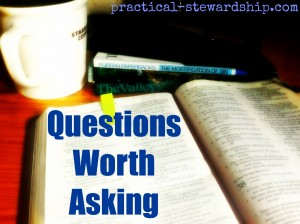The Bible is the Word of God. That sentence alone is staggering, yet it is lost on us much of the time. We easily take for granted that God has recorded for us in objective, written form what He wants us to know. We also take for granted the work and death of many who have labored to bring it to us in English and other common languages (as opposed to the original languages and Latin).
Evidently, it’s important to God that we know what is in the Bible. But a candid video recording of our lives on a typical Tuesday would reflect – for many of us – that the Bible just ain’t that important.
Think about it. How many of us have multiple copies of the Bible in our homes but scarcely pick up a single copy during the week? Saints of past generations accurately liken that to juggling pearls in a tide pool: careless, presumptuous, thankless and foolish.
If William Tyndale could be troubled about anything while he’s in heaven, our take-it-or-leave-it attitude toward the Bible would would certainly do the trick. The same would no doubt hold true for Martin Luther and other Reformers, the Puritans, many of our founding fathers and still more recent generations, as well. They could no more comprehend how someone could casually dismiss Scripture and its principles as optional or outdated than we can conceive of breakfast with a Martian.
The Holy Club of Oxford touched on the issue of Scriptural intake regularly when working through their twenty-two questions that are quite worth asking. Questions 7 and 8 from the Holy Club questions both pertain to the Christian’s reading and application of the Bible. For today, we’ll take a look at #7:
-
 Did the Bible live in me today?
Did the Bible live in me today?
If we are to lead lives that are honoring to God, we must know what He has said. But while it is one thing to know what the Bible says, it’s quite a different thing for the Bible to “live in” us.
Quite simply, this is a reference to the application of Scripture. That is, doing what the Bible says to do.
I anticipate some objections by people who have no interest in reading (let alone, applying) the Bible.
I don’t need to read the Bible to know I’m a sinner.
This is true. Every person knows he’s a sinner, whether he admits it or not. But apart from God’s Word, we don’t actually know how bad we are. We don’t know the bad news of the Gospel, namely, that all men fall short of God’s righteous standard (Romans 3:23).
But more than this, apart from Scripture, we are left in our sins. The Bible also contains the good news of the Gospel. But I’ll come back to that in a minute.
Ignorance is bliss. If I read the Bible, I’ll be accountable for what it says; I’d rather not know and be regarded as innocent.
There isn’t ignorance enough to render a man innocent before God. And we’re not talking about the oblivion of babies who don’t know what they’re doing; we’re talking about people with an inherent sense of morality who pretend that they don’t, that there is no higher standard for righteousness beyond what they’d like to govern their lives.
According to Romans 1, men’s intrinsic knowledge of God and the mere observation of creation is sufficient to damn them. All of history testifies to this. As we’ve already observed, from the beginnings of human history, men have been fully aware of several things; ancient writings, religious practices and philosophies from Egypt to Babylon to Persia to Asia to New Mexico speak to man’s awareness that he is an eternal being and that he is in need of a savior. But men have repeatedly rejected Jesus Christ, the only Savior who can actually save anyone. And by so doing, they incur the righteous wrath of God.
So men’s ignorance of the Bible doesn’t really help them at all. All are guilty before God, whether they read the Bible or not. Not reading the Bible only keeps its rejectors in darkness. It keeps them from the good news of the Gospel, namely salvation from the consequence of our sin and fellowship with God Himself.
I don’t need to read the Bible to know how to live.
Perhaps, but you don’t know better than God.
The Bible routinely exposes our lack of wisdom. It speaks to how we are to deal with life circumstances in principle, and the wisdom it gives is often different from what I would have come up with. It deals with matters of how to deal with friends, neighbors and family that speak to the genius of our Creator.
So the Bible is worth reading in its own right, but indulge me while I issue a rebuke.
It is the height of presumption to suggest that our knowledge of how to live is better or wiser than what God has said in the Bible. Imagine a six-year-old giving advice to her parents about their budget and troublesome family members. Now multiply that wisdom gap by a trillion and you’re starting to get the idea.
How easily we forget that God made us. If He did not wish for us to be alive, we wouldn’t be. Acknowledge it or not, we are dependent upon Him. Ought we to heed His Word when He has given us clear instruction as to how we are to live in His world?
It seems that the Holy Club thought that this was worth daily effort. I’d suggest that we do the same.
Have you read…?
Twenty-Two Questions Worth Asking